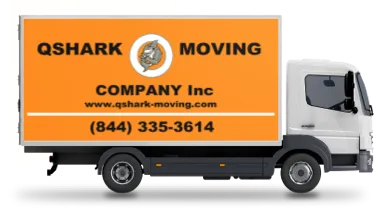What will movers not pack?
| Category | Examples | Alternatives |
|---|---|---|
| Hazardous Materials | Gasoline, aerosols, chemicals | Dispose of properly |
| Perishable Foods | Fresh fruits, opened food containers | Consume before moving, donate or dispose of properly |
| Plants | Indoor and outdoor plants | Give away, donate, or move yourself |
| High-Value Items | Jewelry, artwork, antiques | Carry with you, get additional insurance |
| Personal Items & Important Documents | Passports, financial documents, medications | Keep with you during the move |
| Pets and Animals | Dogs, cats, fish | Transport them yourself |
| Items Requiring Special Handling | Pianos, pool tables, large appliances | Hire specialty movers, disassemble if possible |
About Moving Company
Relocating can be an exhilarating yet exhausting endeavor. Many individuals hire professional movers to ease this process, allowing them to focus more on the adventure of starting anew. However, one often overlooked factor when planning a move involves understanding what these movers will and will not pack.
While it might seem that anything that can fit into a box should be fair game, there are many items that even the best movers won’t handle due to a variety of reasons, like safety, legality, or practicality. This guide will help you understand these complexities and plan accordingly to ensure a smooth move.
To get started, it’s important to note that regulations and policies can vary between different moving companies. Whether you’re looking at Orange County Movers, Movers San Diego, or Irvine Movers, always check the specific company’s rules before making any assumptions.
Key Points to Remember
- Professional movers cannot move all items due to safety, legality, and practicality considerations.
- Regulations and policies may differ from one moving company to another, so it’s crucial to check the company’s specific rules beforehand.
- This guide provides a general overview of items commonly not moved by professional movers, regardless of the specific company.
Throughout this guide, we will delve into each category of items that movers typically will not pack, and provide a detailed explanation of the reasons behind these regulations. By doing so, we aim to help you prepare effectively for your move, making the process as stress-free as possible.
We’ll discuss everything from hazardous materials and perishable food items, to high-value items, personal documents, and items that require special handling. We’ll also explore alternative solutions for moving such items to help you plan your move efficiently.
Whether you’re using a moving service for local moving, office moving, or even require specialized piano movers, or need day labor or packing services, this guide is here to assist you every step of the way. The same principles apply even if you’re using long distance movers, making this a versatile guide for all your moving needs.
Stay tuned to this in-depth guide to avoid any surprises on moving day and ensure a smooth transition to your new home with your chosen Moving Company.

II. Understand the Legal and Safety Regulations
Before delving into the specifics of what movers won’t pack, it’s vital to comprehend the overarching legal and safety regulations that guide moving companies. These rules aren’t put in place arbitrarily; they aim to ensure the safety of everyone involved, including the movers, the customers, and the public.
Legal Regulations
Federal and state laws have explicit rules about what can and cannot be transported by professional moving companies. Items deemed hazardous or potentially dangerous are often prohibited. Failing to adhere to these rules can lead to serious legal consequences for the moving companies.
Key Points:
- Laws dictate what movers can transport.
- Non-adherence can lead to legal ramifications.
Safety Concerns
Safety regulations play a crucial role in defining what movers will and won’t pack. Certain items can be risky to transport due to their flammability, potential for causing damage, or other inherent risks.
Key Points:
- Safety considerations heavily influence the items that movers won’t pack.
- Items that pose risks to the movers, the public, or other belongings won’t be moved.
Understanding these regulations is the first step in knowing what to pack and what to leave out. Now let’s move onto the specifics, starting with hazardous materials.
III. Hazardous Materials
Hazardous materials pose a significant safety risk during transportation. These materials can be dangerous and in some cases, illegal to move. Here’s a list of common household items that are generally considered hazardous:
- Aerosol cans
- Ammunition and guns
- Car batteries
- Chemicals (like bleach, cleaning supplies, and pesticides)
- Fire extinguishers
- Gasoline
- Nail polish and remover
- Paints and varnishes
- Propane tanks
Most moving companies won’t handle these items due to the inherent risks they pose, such as flammability, explosiveness, or corrosiveness. Making alternative arrangements for these items is essential when planning your move. You might need to dispose of them safely, recycle them, or move them separately.
Alternative Solutions for Moving Hazardous Materials
While it’s not recommended, if you need to move hazardous materials, consider these alternatives:
- Transport them yourself: If the items are safe to transport in a standard vehicle and you’re comfortable doing so, you can move them yourself. But remember, safety comes first.
- Hire a specialty mover: Certain companies specialize in moving hazardous materials. These movers are specially trained and equipped to handle these items safely.
- Dispose of or donate: For items that can’t be safely transported, consider disposing of them properly or donating them if possible.
Stay tuned for our next section to discuss why perishable food items are not typically moved.

IV. Perishable Food Items
Food items, particularly those that are perishable, can pose a unique set of challenges during a move. Perishable food items are not typically packed or moved by professional movers due to several reasons.
Why Perishable Food Is Not Moved
- Spoilage: Perishable items can spoil without proper refrigeration, leading to unpleasant odors and potential health risks.
- Attraction of pests: Spoiled food can attract pests, which can infest other items during the move.
- Damage to other items: Leaking food items can cause damage to other goods during transit.
Examples of perishable items include:
- Fresh fruits and vegetables
- Dairy products
- Meat, poultry, and fish
- Opened food containers or jars
Disposal and Donation of Perishable Foods
Before your move, consider these options for your perishable food items:
- Plan your meals: In the weeks leading up to your move, try to consume the perishable items in your refrigerator and freezer. Plan your meals accordingly to minimize waste.
- Donate: Consider donating unopened, non-expired food items to local food banks or shelters.
- Dispose of properly: For items that cannot be consumed or donated, ensure proper disposal to avoid creating health hazards.
Tips for Packing Non-Perishable Food Items
While movers usually won’t pack perishable food items, non-perishable items can typically be moved. Here are some packing tips for those:
- Use sturdy boxes and ensure each item is well-protected to avoid breakage.
- Seal open packages with tape to prevent spillage.
- Keep similar items together for easy unpacking.
- Clearly label each box with its contents and handling instructions.
Next, we will delve into the complications surrounding moving plants.

V. Plants
Believe it or not, moving plants can be complicated. Legal, health, and practical reasons all come into play, making plants an item many professional movers won’t pack or move.
Why Moving Plants Is Complicated
- State Regulations: Some states have regulations or quarantine restrictions against certain types of plants to prevent the spread of pests or diseases.
- Health of the Plants: Long trips, especially in a moving truck’s unregulated climate, can be detrimental to a plant’s health.
- Potential Damage: Plants can easily be damaged during the move, and soil can spill, causing damage to other items.
Alternatives for Moving Plants
When moving, consider these options for your plants:
- Give to friends or family: If you can’t take your plants, consider giving them to friends or family for safekeeping.
- Donate: Many schools, hospitals, or community centers may appreciate the donation of healthy plants.
- Transport them yourself: If regulations allow and your plants are small enough, consider moving them in your vehicle where conditions can be controlled.
In the next section, we’ll address the concerns with packing and moving high-value items.
VI. High-Value Items
When moving, it’s essential to consider how to handle high-value items best. Due to their significant worth—monetary, sentimental, or both—these items are typically recommended to be moved separately for safety and security reasons.
Definition of High-Value Items in a Move
High-value items can include but are not limited to:
- Jewelry
- Artwork
- Antiques
- Collectibles
- Expensive electronics
- Important legal documents or bonds
- Family heirlooms
Why Moving High-Value Items Is Sensitive
- Potential for Damage or Loss: These items are often fragile or irreplaceable, increasing the risk associated with moving them.
- Insurance Limitations: Standard moving insurance may not cover the full value of these items if they’re damaged or lost.
Handling High-Value Items During a Move
Here’s how you can safely handle your high-value items:
- Carry Them With You: If possible, carry small, high-value items to ensure their safety.
- Appraise and Insure: Consider getting them appraised and obtaining additional insurance coverage for larger items.
- Hire Specialized Movers: Certain movers specialize in handling high-value items and may offer better insurance coverage.
Now, let’s talk about another category of items you should ideally keep with you during the move – personal items and important documents.
VII. Personal Items and Important Documents
Personal items and important documents are often best kept close during a move. The risk of misplacing these items during the packing and moving process can lead to significant stress and potential problems down the line.
Common Personal Items and Important Documents
Here’s a list of typical personal items and important documents that you might want to move:
- Passports and identification cards
- Birth certificates
- Financial documents (bank statements, tax returns, etc.)
- Insurance policies
- Medical records
- Keys
- Cash
- Prescription medications
- Personal electronic devices (phones, laptops)
Packing and Transporting Personal Items and Documents
Consider these tips when handling these important items:
- Keep all important documents in a secure, waterproof container.
- Make digital backups of crucial documents and store them in a secure online location.
- Keep prescription medications in a bag that stays with you, and ensure you have enough for a few days during and after the move.
Our next section will address why movers do not transport pets and animals and how to move with pets safely.

VIII. Pets and Animals
Your furry, scaly, or feathered friends need special consideration when moving. Due to safety, stress, and potential legal issues, professional moving companies typically do not transport pets or animals.
Why Movers Don’t Move Pets
- Stress for Pets: Moving can be stressful for pets. Being transported in a moving truck can exacerbate this stress.
- Safety and Health Risks: The environment in the back of a moving truck isn’t suitable or safe for animals.
- Legal Liability: There are many laws and regulations regarding the transport of animals, particularly across state lines.
Safely Moving With Pets
When moving with pets, consider the following steps to ensure their safety and comfort:
- Travel with your pets: If possible, have your pets travel with you in your vehicle. This way, you can ensure their comfort and safety.
- Visit the vet: Before the move, take your pets to the vet for a check-up and to discuss any potential concerns with the move. This is also a good time to ensure all vaccinations are up to date, especially if moving across state lines.
- Pack a pet essentials bag: This bag should include food, water, a leash, a favorite toy, and any medications your pet needs. This will help to keep them comfortable during the move.
Next, we will talk about items that require special handlings, like pianos and artwork, and why some movers may not move these items.
IX. Items Requiring Special Handling
Certain items require special handling due to their size, shape, or fragility. These items can include:
- Pianos
- Artwork
- Antiques
- Large furniture
- Pool tables
- Large appliances
Moving these items may pose a challenge to regular moving companies due to the potential risk of damage or the need for special equipment or expertise.
Alternative Solutions for Moving Specialty Items
- Hire Specialty Movers: Certain companies specialize in moving items that require special handling. These movers have the necessary equipment and expertise to handle these items safely.
- Disassemble: If possible and practical, disassemble larger items to make transportation easier.
- Packing and Protection: Ensure specialty items are appropriately packed and protected during the move. Special packing materials may be required to provide adequate protection.
We hope this guide has comprehensively understood what movers will not pack and why. With this knowledge, you’re now ready to plan your move effectively. Remember, when you’re ready to move, Qshark Moving Company is here to help, whether you’re moving locally, long-distance, or require any of our other specialized services. Happy moving!
X. Conclusion
Understanding what movers won’t pack helps you plan your move more effectively and efficiently. It allows you to sort and organize your belongings, deciding what to move, dispose of, or handle differently.
When you’re clear about what you need to do with hazardous materials, perishable food items, plants, high-value items, personal items and important documents, pets, and items requiring special handling, you can prevent surprises on moving day. This preparation not only reduces potential confusion and stress but also ensures the safety and security of your valuable possessions.
And remember, while there may be items that movers won’t pack, a lot goes into a successful moving experience. At Qshark Moving Company, we are dedicated to making your moving process smooth and hassle-free. Whether you’re looking for local moving, long distance movers, office moving, or packing services, our professional movers are here to help.
Check out our services if you’re in the Orange County, San Diego, or Irvine areas. And for those with specific needs, we also offer piano moving and day labor services.
Happy moving, and we look forward to serving you!


